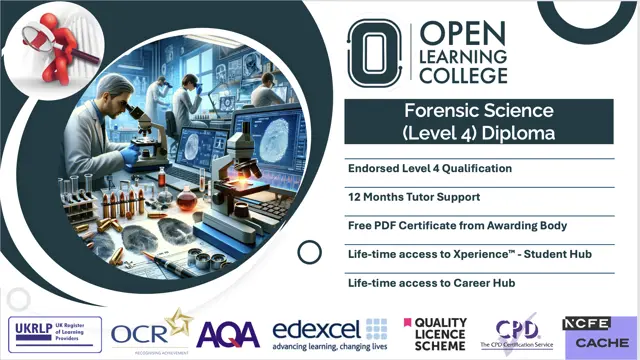Funding options available on our website
- CPD & OPA - Free
- Exam(s) / assessment(s) is included in price
- Tutor is available to students
- TOTUM card included in price What's this?

Funding options available on our website
Embark on a transformative learning journey with the UK’s most innovative home study provider, offering courses designed to unlock your true potential and facilitate the career change you desire. Access our distance learning courses directly from anywhere, anytime, and acquire industry-recognised Professional Qualifications essential for advancing in your career.
Specifically, explore the flexible and convenient Forensic Science (Level 4) course, an ideal way to gain a diploma qualification. Whether you aim for further education, improved job prospects, or expanded knowledge, this comprehensive course allows you to prepare thoroughly for exams or careers through home study. Plus, it’s structured to be accessible and beneficial even if you have no prior knowledge in Forensic Science.
The Level 4 Forensic Science Diploma comprises twenty individual modules, each delving into distinct aspects of crime scene investigation.
The initial module centers on the science of crime scene investigation (field forensics), focusing specifically on the crime scene itself. It imparts an understanding of the crucial factors of time, care, and meticulous attention to detail when evaluating a crime scene.
Subsequent modules delve into evidence obtained from crime scenes, the legal categories of evidence in criminal investigation, and distinguishing between individual and class characteristics of evidence. The course provides detailed examinations of Biological, Non-Biological, Fingerprint, Ballistics, and Arson evidence.
This tailored course also encompasses the study of evidence at Explosive Scenes, highlighting the distinctions between accidental explosions and bomb-triggering events. It investigates how and why bomb scenes are processed, emphasizing the significance of understanding explosive variations to aid Bomb Scene Investigators in identifying critical evidence.
Forensic Pathology is comprehensively detailed in the following modules, encompassing forensic pathology at both crime scenes and mortuaries. These modules cover the roles of Coroners and Pathologists, the collection of evidence, and the estimation of time of death. Autopsy procedures are explored, along with the various ways in which death can occur and how forensic pathologists recognize these causes.
The subsequent modules shift the focus to different roles within Forensic Science, namely Forensic Anthropology, Forensic Odontology, and Forensic Entomology.
The program also details Forensic Botany, covering the role of forensic botanists, palynology, anatomy, dendrochronology, plant ecology, and limnology.
Forensic Serology is explored, examining the role of forensic serologists, blood typing, and the analysis of blood, semen, saliva, and other bodily fluids in the laboratory.
The subsequent modules delve into DNA Typing, Forensic Toxicology, and Firearms Investigation:
Lastly, the student explores questioned documents and the role of questioned document examiners, covering handwriting analysis, typewriters, typewritten documents, word processors, printed documents, forged document examination, inks, papers, and document verification.
Each module within the Forensic Science Diploma emphasizes the importance of preserving the chain of custody or the chain of evidence at a crime scene.
This course is designed as a progressive continuation from our Level 3 Forensic Science
Digital certificate - Included
Open Learning College have undergone external quality checks to ensure that the organisation and the courses’ it offers meet a high standard. Regular reviews of our courses are carried out as part of the endorsement process.
The course depth and study has been benchmarked at Level 4 against level descriptors published by Ofqual.
Visit www.cpduk.co.uk for more information.
1. You will receive your accreditation directly from CPD (CPD.dip), once you have successfully completed your course (certification fees are included in the course fee).
2. You will receive the Open Pathway Accreditation Diploma (OPA.dip) from Open Learning College.
What Will You Learn?
You’ll need to have:
* the capacity to undertake fine, analytical, painstaking work with exceptional attention to detail
* a logical, unbiased and methodical approach to problem solving
* a persistent approach and enquiring mind
* the ability to work well in a team, as well as independently
* strong written and oral communication skills and the ability to communicate scientific information to non-experts
* the ability to work to deadlines
* good colour vision.
You’ll need to have:
* the capacity to undertake fine, analytical, painstaking work with exceptional attention to detail
* a logical, unbiased and methodical approach to problem solving
* a persistent approach and enquiring mind
* the ability to work well in a team, as well as independently
* strong written and oral communication skills and the ability to communicate scientific information to non-experts
* the ability to work to deadlines
* good colour vision.
Forensic Science is a competitive area to get into so make sure you have some lab experience and a related scientific degree
As a forensic scientist you’ll provide scientific evidence for use in courts of law to support the prosecution or defence in criminal and civil investigations.
Currently there are no reviews for this course. Be the first to leave a review.
This course is advertised on Reed.co.uk by the Course Provider, whose terms and conditions apply. Purchases are made directly from the Course Provider, and as such, content and materials are supplied by the Course Provider directly. Reed is acting as agent and not reseller in relation to this course. Reed's only responsibility is to facilitate your payment for the course. It is your responsibility to review and agree to the Course Provider's terms and conditions and satisfy yourself as to the suitability of the course you intend to purchase. Reed will not have any responsibility for the content of the course and/or associated materials.